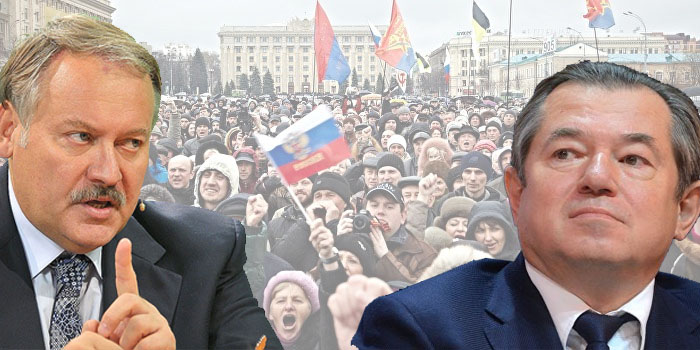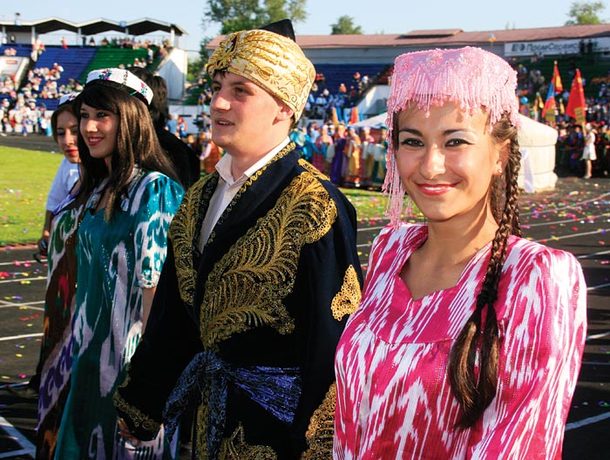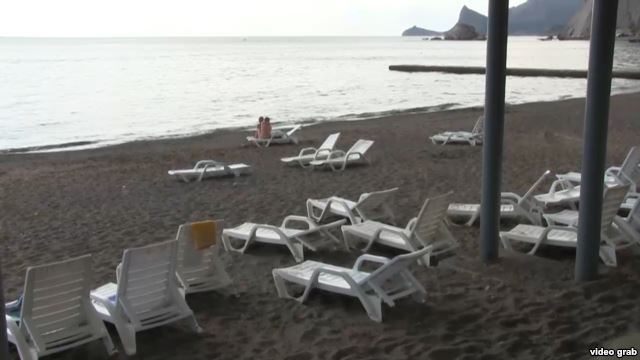When Ukrainian prosecutors released audio intercepts that appeared to show the direct involvement of Kremlin top advisor Sergey Glazyev in Russia’s takeover of Crimea and pro-separatist rallies in eastern Ukraine in August 2016, they served as a turning point in the discussion about the war in Ukraine. The Kremlin’s interference in the conflict termed the “Ukrainian crisis” became apparent, leading some analysts to insist the Minsk agreements to establish peace in eastern Ukraine should be reconsidered so that Ukraine’s fulfillment of their political part does not equal the country’s capitulation to Russia.
Widely known as the “Glazyev tapes,” the recordings revealed that, apart from orchestrating the occupation of Crimea, Putin’s entourage called for popular uprisings in mainland Ukraine’s Kharkiv, Odesa, and Dnipro in February-March 2014 to create the preconditions for the puppet state of Novorossiya. At the time, Putin’s advisor Sergei Glazyev refused to comment on them, and Director of Institute of CIS countries Konstantin Zatulin said that it was indeed his voice in the recordings, but what was heard was a “compilation and manipulation.”
But that was, apparently, only one part of the full Glazyev tapes. Between December 2017 and June 2018, Ukrainian prosecutors shared many more details from the intercepted phone calls between Putin’s advisor Sergei Glazyev and Director of Institute of CIS countries Konstantin Zatulin. They were played in Kyiv’s Obolon court as part of the case on the state treason of runaway ex-President Viktor Yanukovych. Both Glazyev and Zatulin are wanted by Ukraine’s Military Prosecutor’s Office and will be judged in absentia. Yanukovych's treason trial had finished on 24 January 2019, he was sentenced to 13 years in prison.
A transcript of the sessions in five parts was published on Censor.net by Ukrainian journalist Iryna Romaliyska. We bring you the most interesting information, which was, unfortunately, largely overlooked in the English-language press.
Part 1: $25,000 for takeover of Crimea, Kharkiv, Odesa
27 February 2014. On this day, the Crimean Parliament was seized, the Russian tricolor was raised above it, Aksyonov was appointed as the self-proclaimed governor, and a decision to hold a “referendum” was made.
According to one of the conversations on this day, Zatulin asks Glazyev for money to finance the incitement of separatism in Kharkiv and Odesa. Zatulin says that he had already wired $25,000 from his Institute to fund operations in Crimea as well as separatist actors in Kharkiv and Odesa, and asks Glazyev to issue an order to somebody called “friend” to that purpose. Glazyev asks about the needed sum. Zatulin answers: “Well, taking into account the expenditures ahead, up to 50. Tomorrow.” Glazyev agrees.
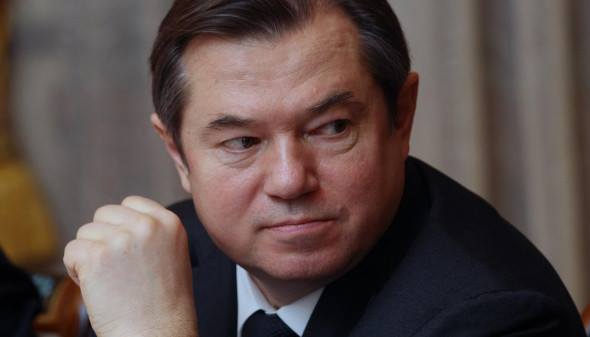
Then the interlocutors specify who exactly in Kharkiv and Odesa needs the money. Zatulin mentions “Oplot,” a pro-Russian organization in Kharkiv which led pro-Russian demonstrations in the city in 2014 and then supported the Russian-backed militants in Donbas, after which Ukraine recognized “Oplot” as a terrorist organization, as well as the “Odesskaia Druzhyna,” a pro-Russian organization in Odesa. Both were created by ex-Ministry of Internal Affairs employees.
Regarding the latter, the interlocutors agree to check its capabilities with Sergei Kivalov, a pro-Russian politician who at the time was part of Yanukovych’s Party of Regions, and currently is part of the Opposition Bloc as well as the President of the National University “Odesa Legal Academy.” He was also a co-author of the notorious “Kivalov-Kolisnychenko language law” which has been called the “Kremlin’s Trojan Horse in Ukraine” due to the conditions it created for the Russification of Ukraine. Kolisnychenko, who in 2014 fled to occupied Sevastopol was also mentioned in the conversation: he accompanied Russian delegations to Sevastopol.
Afterward, the interlocutors discuss the appeal of the Presidium of the Crimean Parliament, which declared the transitional government which arose after President Yanukovych fled Ukraine illegitimate, and announced a referendum on the “improvement of the autonomous status of the peninsula.” The sham “referendum” took place on 26 March 2014 and was followed by the annexation of Crimea by Russia.
Zatulin was surprised why the question of changing the Crimean government had not been initiated yet and mentions Sergei Aksenov, the current “Head of Government” of occupied Crimea.
He says that roughly six thousand pro-Russian protesters with Russian flags are in front of the Parliament, but neither Tsekov (at the moment, the deputy speaker of the Crimean parliament), nor Aksenov, who was at the time an MP of the Crimean Parliament from the party “Russkoie Yedinstvo” and had previously headed various pro-Russian organizations in Crimea, was at the spot.
Glazyev is indignant at their inaction: “Holy f*ck. We fed them for so long,” suggesting that Russia had financed the politicians in Crimea for a long time before the start of the occupation.
Zatulin also mentions that he plans to fly into Simferopol on 28 February to meet the Crimean Parliament speaker Vladimir Konstantinov. That day, the parliament dismissed the acting government, and Aksyonov was appointed as the self-proclaimed governor.
28 February 2014
A conversation between the interlocutors the following day once again highlighted Zatulin’s financial problems with funding separatist movements in eastern Ukraine. He tells Glazyev that
“we had funded Kharkiv, funded Odesa. There are applications from other regions, but I put everything on hold as I hadn’t solved the financial question yet, and I’m the only one carrying these responsibilities. Right now I paid the Cossacks [pro-Russian militant groups in Crimea – Ed] the money which 10 people promised them but nobody gave sh*t. And so on. So the financial question starts to be irritating.”
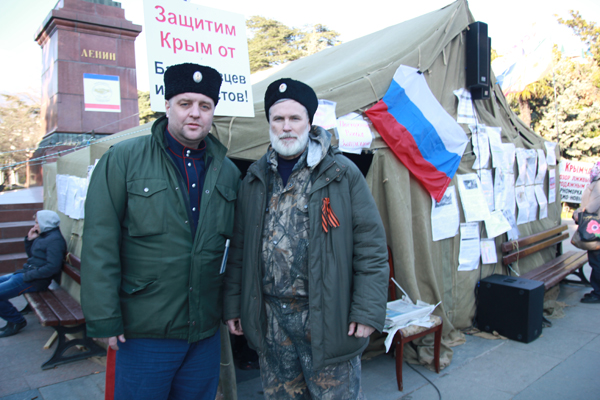
He later adds that he had talked to Sergei Kivalov who was “fully supportive” of a large pro-Russian rally happening against the Euromaidan, and had given money the people there, “although not as much as they liked, but as much as I had.”
Remarkably, despite evident collaboration with Russian officials planning to tear up Ukraine, Kivalov still holds the position of a Ukrainian MP and is the president of a university in Odesa.
The next day, on 28 February 2014, Glazyev and Zatulin also discussed the situation in Crimea once again, focusing on a “woman who will be buried soon.” Glazyev demands to cover this event “properly:”
“This has to all be done properly in the propaganda sense. So they will be heroes and so on. So that people would be there. This event is very important. […]It’s necessary for the Parliament to commemorate them with a minute of silence.[…]So that they will be declared heroes of the resistance or whatnot,” he instructs.
Taking the events in Crimea at that time into account, it’s likely that the conversation touches upon two killed participants of a numerous protest near the Crimean parliament on 26 February, when clashes between pro-Russian and pro-Ukrainian protesters took place. The “courts” in occupied Crimea had later sentenced Crimean Tatar Mejlis leader Akhtem Chiygoz for participating in this protest; Ali Asanov and Mustafa Dehermendzhi are still in detention.
The same day, 28 February, the interlocutors discussed candidates to the Crimean government of Aksenov. The candidates were offered directly by Glazyev (his personal friend Major General Razumovsky, ex-journalist and ex-advisor to the self-proclaimed “Luhansk People’s Republic” Yuriy Pershikov) as well as by active pro-Russian movement member Konstantin Knyrik.
In this conversation, Glazyev recommends leaving Sergei Korovchenko, who headed Crimea’s Justice Ministry in 2014, in his position, saying that this person was recommended by Viktor Medvedchuk, a notorious pro-Russian politician who has Vladimir Putin as the godfather of his daughter.
“I contacted Medvedchuk, they will give their proposals. They have the Crimean Justice Minister there […], they characterize him well. He says we will prop up the legal team. We need to keep this Korovchenko. He’s the Justice Minister of Crimea and we need him to stay,” “Glazyev” said.
Currently, Sergei Korovchenko carries out political activities in the city of Pryluky in Ukraine’s northern Chernihiv Oblast, and in 2017 he applied for the position of a judge in Ukraine’s Supreme Court.
In another recording from 28 February, the interlocutors say that while there are enough military commanders to manage the occupation, there is a lack of a political coordinator. “Glazyev” mentioned that he would ask that a certain “Slava” be returned as a political curator, so that “he would take up this coordination and work with everybody.” This mentioned Slava is extremely likely to be Vladislav Surkov, who, according to Russian MP Ilya Ponomaryov, developed the strategic plan to seize Crimea from Ukraine.
Part 2: "We need to expand to the North"

28 February 2014. The day before, unmarked soldiers seized the buildings of the Crimean Parliament and Government. On 28 February, Russia continued to bring its troops to Crimea and take military objects under control, Kyiv announced that Russia is conducting a “military invasion and occupation.” Viktor Yanukovych gives a press conference in Rostov na-Donu where he declared that the power in Ukraine was seized by “nationalist pro-fascist youngsters,” future Ukrainian President Petro Poroshenko arrives in the Crimean capital of Simferopol, but pro-Russian protesters didn’t let him in the building of the Parliament, Crimean Tatar Mejlis leader Mustafa Dzhemilev announced that the Mejlis is ready to arm itself.
In a recording of a conversation between Zatulin and “Glazyev” from 28 February 2014, Zatulin says that the day before, Sergei Belaventsev, a friend of “Sergei Kuzhugetovich” (most probably, the latter is Russian Defense Minister Shoigu) had been conducting “different types of work” to get Aksenov into power. As well, he mentions that Belaventsev had been working on the candidature of Leonid Grach, one of the former leaders of the Communist Party of Ukraine, who the Russian Communists proposed making the Head of Crimea to Vladimir Putin in 2014. Zatulin says that Grach didn’t fit the role, so then Aksenov’s candidature was taken up.
In another call that same day, “Glazyev” rings up Zatulin to tell him about “certain economic calculations […] which say that this peninsula doesn’t have its own electricity, water, or gas.”
Zatulin answers that he was present at a meeting with “Belous” – probably, Andrei Belousov, the former Russian Economy Minister and advisor to Putin who was visiting Crimea in those days, where these issues were discussed.
Glazyev: “There is a solution to these questions. A quick and effective one. It’s enough to look a bit to the north.”
Zatulin: “Well, I think he will return today [to Moscow – ed], you need to meet him. He’s going to conduct meetings there, call up ministers and so on.
Glazyev: “Listen, while he’s going to conduct all that crap, bring this to people’s attention. Because a lot depends on their position. We need to expand.”
Read more: Occupied Crimea is running out of water; Siemens' Crimea sanctions break - a case of criminal negligence | #SiemensGate
On 1 March 2014, Glazyev received a call from Aziz Abdullaev, a Crimean Tatar who at that moment held the post of the first vice-Prime Minister of the Autonomous Republic of Crimea and was the Minister of Regional Development.
At this time, Russian officials were preoccupied with finding ways to deal with the indigenous population of Crimea, the Crimean Tatars, who showed the most resistance to Russia’s occupation.

On 28 February, Zatulin discussed that he was planning to meet the Head of the Crimean Tatar Mejlis Refat Chubarov in order to find out whether the Crimean Tatars were planning to accept Aksenov’s proposal to take up money and more posts in the government in return for accepting the impending annexation – an offer which they ultimately declined. In his call, Abdullaev confirms that the Crimean Tatars did not take up Aksenov’s proposal for ministerial positions and asks Glazyev what future the Crimean Tatars could have with the new situation in Crimea, whether there will be a Crimean Tatar autonomy like in the Russian Federation’s Tatarstan. In response, Glazyev asserts that Russia has no plans to annex Crimea. The interlocutors discuss what could be promised to the Crimean Tatars so they would take up Russia’s side. Abdullaev says that Crimean Tatars need guarantees and perspectives – something which Ukraine didn’t give in the previous 20 years.
As well, they discuss falsifications during the vote during the extraordinary session Crimean Parliament which took place on 27 February.
According to official data, 61 out of 64 deputies had voted in favor of conducting a referendum amongst the inhabitants of the peninsula on 25 May 2014 (however, itsepa actually took place on 16 March). The only question put forth sounded as follows: "The Autonomous Republic of Crimea enjoys state independence and is a part of Ukraine on the basis of agreements and treaties." People were given the option to answer "yes" or "no."
Abdullaev expresses his indignation that the vote was falsified, telling “Glazyev” that many of the people who supposedly voted in favor of the decision were either standing by “them” (by this, Abdullaev probably means they were present at the rally in front of the Parliament), or were on a business trip to Kyiv.
Part 3: a single plan to call for Russian troops
1 March 2014: Russian servicemen continue capturing and blocking Ukrainian military and civilian objects in Crimea, and self-proclaimed Prime Minister Sergey Aksenov asks Vladimir Putin for help. At the same time, attempts to seize regional administrations and hoist the Russian flag above them continue throughout eastern Ukraine. On that day, the Oblast administration in Kharkiv was captured and the Donetsk one stormed, pro-separatist rallies were held simultaneously in several Ukrainian cities. And in Russia, an evening extraordinary meeting of the Security Council allows Putin to use the Russian army on the territory of Ukraine, a decision necessitated by, as explained by Putin, a letter of the “legitimate Ukrainian president Yanukovych” asking to introduce troops into Ukraine. This letter is the main article of proof for Yanukovych’s state treason, which is imputed by the prosecution. In parallel with these events, Putin’s advisor Sergei Glazyev conducts telephone conversations with various people, coordinating separatist actions in Ukraine.
Conversation 1. Denys Yatsiuk, an activist from the Odesa anti-Maidan movement, calls Glazyev and asks for concrete advice and guarantees of support. Glazyev assures himthat the pro-Russian insurgents will be supported by Russia, and advises Yatsiuk to urge rallies to appeal directly to Putin, asking for Russian protection. As well, he instructs him to take over the regional council and intimidate the local deputies into voting for a resolution condemning the interim government in Kyiv as illegitimate. “Whoever didn’t come and vote is a traitor, banderite, fascist, etc., with all ensuing consequences,” Glazyev instructs on intimidating the deputies. Glazyev says that this all has to be done by tomorrow.
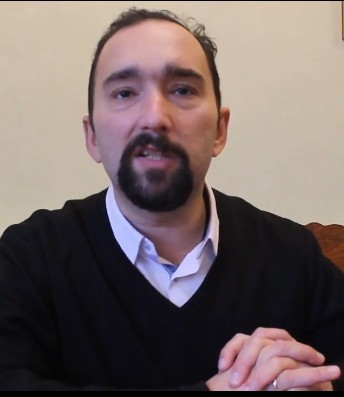
Afterward, Glazyev asks to speak to Kirill Frolov, an Orthodox activist and employee at the Institute of CIS countries co-founded by Konstantin Zatulin – apparently, the Russian was in Odesa at the time. Glazyev instructs Frolov to coordinate with an unidentified Marat, who “took it upon himself to sort of help this whole operation,” and Oleg Markov, brother of the pro-Russian deputy of the Odesa city council Ihor Markov who Glazyev said is with Marat.
Conversation 2. Glazyev speaks to “father Andrei.” Censor.net.ua supposes he is the Odesa priest Andrei Novikov who fled to Russia in April 2014. Father Andrei mentions that the pro-Russian rally is dissipating, but Frolov is still “trying to organize something,” and verifies that the decision to use the Russian army outside of Russia applies to the whole territory of Ukraine, not only Crimea.
Conversation 3. Glazyev speaks to who censor.net.ua believes is Kirill Frolov. They mention Anton Davidchenko, one of the leaders of the pro-Russian organizations active in the wake of Euromaidan.
Frolov reports from the rally in Odesa to Glazyev, telling that it was very numerous and that Anton invited the “liberators” of Crimea, i.e. the unmarked Russian troops, to “liberate” Odesa. Frolov tells Glazyev that the resolution of the rally is in Glazyev’s mailbox. Frolov tells that he departs to Moscow tomorrow to bring “people capable of action” to Odesa, apparently hinting at Russians who would be willing to take the most active part in the protests, including illegal actions such as capturing government buildings. Glazyev responds that this is only the start of the process and that the regional council needs to convene and adopt a resolution condemning the transitional government in Kyiv as illegitimate; Frolov says that the deputies are afraid. Glazyev urges him to keep the rally going and finally occupy the regional council, forcing the deputies to make a decision, and urges Frolov to act faster:
“Make decisive actions, like they did in Kharkiv and Donetsk. There, our guys have captured the regional councils.”
Conversation 4. Glazyev talks with Zatulin, who is apparently in Crimea at the time. He tells him about his idea – to create a pro-Russian analog of Automaidan, a coalition of motorized Euromaidan activists who were instrumental during the Euromaidan protests in Kyiv in 2013-2014, which would be deployed to the adjacent Ukrainian oblasts, and asks whether “the Surgeon” – according to censor.net.ua, Aleksandr Zaldostanov, founder of the “Night Wolves” biker club who calls himself “Putin’s friend - is in Crimea.
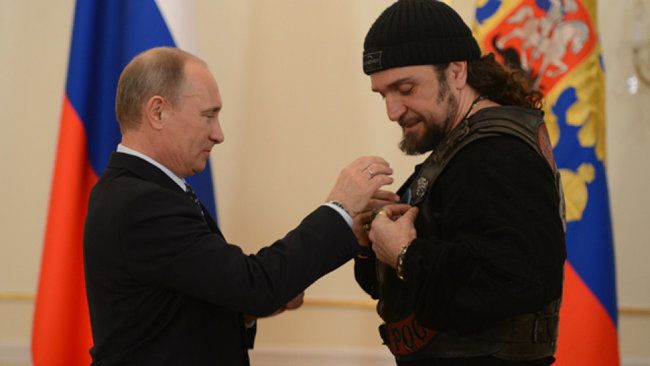
Zatulin says that Surgeon was in Crimea but left, and indeed had the intention of creating a pro-Russian Automaidan. Zatulin informs that Chalyi asked Vasiliev to transmit a letter to VV [apparently, Vladimir Vladimirovich Putin - Ed.] asking for Yanukovych to appoint Chalyi as head of the administration [of Crimea – ed]. Zatulin, however, says that Yansirukovych mustn’t be involved, as “there will be a rebellion here if Yanukovych appears.” Glazyev says he would talk it over with Nikolai Azarov, the former head of Yanukovych’s Party of Regions who fled to Russia following Euromaidan.
Glazyev and Zatulin discuss the situation in Odesa. Zatulin mentions that “we” (i.e. Russia) are not “providing any operative management, just supporting them” [the pro-Russian protesters – Ed]. “Let’s see what they can do on their own. Can they do anything else or can’t they.” Glazyev says that it’s not enough just to provide help, Zatulin agrees and complains that Igor Sirosh, assistant to the head of the Russian Presidential Administration,kons had promised help [for the Russian takeover of Crimea – Ed] but had not provided any.
Conversation 5. “Surgeon” calls Glazyev and asks how important it is that he flies out to Moscow, where a pro-government rally was planned, to counter a rally against Russian meddling in Ukraine organized by the main editor of the radio station Ekho Moskvy. Surgeon tells about his idea to organize humanitarian convoys from Russian cities to occupied Crimea. Glazyev says they needn’t move through the ferry crossing at the Crimean city of Kerch, but rather move through eastern Ukraine, because “it appears that we have our own power now in Kharkiv.” Glazyev urges Surgeon to come to Zaporizhzhia:
“The key city which needs support in Zaporizhzhia. Because without Zaporizhzhia, Crimea won’t survive, it’s not viable.”
Conversation 5. Glazyev tells Zatulin about the need to provide assistance to “our guys” in Dnipro who were blocking a military base with paratroopers given the order to depart to Crimea to block the isthmus connecting it with mainland Ukraine. He says that the “guys” need to connect with the Russian “service” along the army line in order to receive reinforcements for blocking the departure of the paratroopers. Zatulin, who is in Sevastopol, agrees to help.
Part 4: Expanding the "zone"
1 March 2014
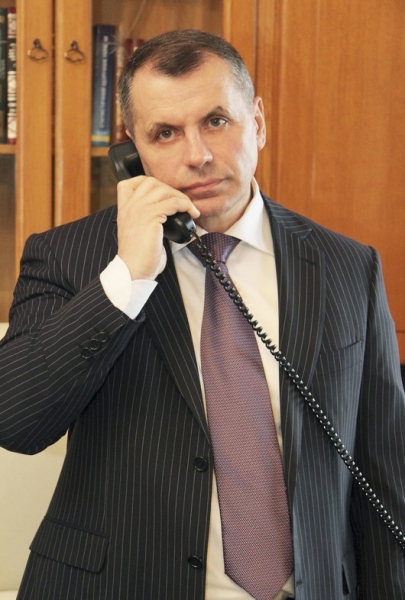
Conversation 1. Glazyev talks to Vladimir Konstantinov, who at that moment was the chairman of the Supreme Rada of Crimea and member of Yanukovych’s Party of Regions. After the occupation, he stayed in Crimea and chaired the “State Council of Crimea,” becoming one of the leaders of the Crimean department of Putin’s Yedinaya Rossiya party.
Glazyev tells that “they” are planning how to help Crimea, saying that there are many ideas, but many things will depend on what’s happening in mainland Ukraine, as Crimea is scarce in resources, and suggests that they in Crimea also work on “expanding the zone [of turbulence in southeastern Ukraine - Ed].”
Conversation 2. Glazyev tells Zatulin that the Oblast Councils in Kharkiv and Donetsk were seized by Russia’s supporters and that a coordination center should be formed for such oblasts. He suggests that such a center be set up in occupied Crimea.
Conversation 3. Glazyev talks to a woman who censor.net.ua has identified as Arina Zakharova, a journalist from Luhansk. He tells her that by tomorrow, Oblast councils should adopt decisions about the illegitimacy of the new Ukrainian authorities and appeal to Russia for help,
“And either the governor implements the decisions of the councils or the councils form their own executive organ and subordinate the executive power until the situation normalizes.”
Conversation 4. Glazyev talks to Valeriy Holenko, the chairman of the Luhansk Oblast council and high-ranking member of Yanukovych’s Party of Regions, and assures him that Russia is ready to provide assistance, but the council should proclaim the Kyiv authorities as illegitimate and the local councils as the only legitimate power, meaning that the executive power should submit to them, and appeal to Russia for help.
Conversation 5. Glazyev talks to an unidentified “Vladimir Andreevich” and asks him to adopt, when possible, a resolution of the Supreme Council [of Crimea - Ed] prepared by Yanukovych’s legal advisor and deputy Head of the Presidential Administration Andriy Portnov. “We need it for the foreign political level so that it will be clear that not all of Ukraine wants to sign the Association Agreement with the EU. [...] Because, you see, the UN Security Council will convene, and the situation will enter the international legal field. It's very important for us to have your position about the EU Association Agreement, so it would be clear that it contradicts the Ukrainian Constitution," Glazyev explains, referring to the document which Yanukovych refused to sign in November 2014, which set the Euromaidan revolution in motion.
Conversation 6. Glazyev talks to an unidentified “Aleksei Vasilievich.” “We aim to … go after the appeals of the Ukrainian society to us [Russia – Ed], that’s why we need mass rallies, appeals of people to Russia, to the Russian president for help,” Glazyev urges, saying that Oblast Councils need to be seized and decisions of the councils were to be adopted saying that the Kyiv authorities are illegitimate and that the Oblast Council takes responsibility for the territory and creates an executive committee. “This is the formula which will allow us to give you further support,” Glazyev says, adding that simply holding rallies is not enough.
Conversation 7. Glazyev talks to Ukrainian businessman and MP Lev Myrymskyi. Myrymskyi, as a native of Crimea, offers Glazyev his assistance in being a negotiator between Crimea and Kyiv. Glazyev says that this is possible only if he is with “them,” i.e. Russia:
“There is a war, you understand? We need help. That’s why Zatulin is a boss there [in Crimea], who coordinates all this war on the social-political front.”
Conversation 8. Glazyev calls Zatulin and warns that a group of Crimean Tatars were planning to capture the Crimean Council [which was by that time seized by unmarked Russian soldiers – Ed], and that Mirimskyi should not be an intermediary, and that the Crimean authorities should not appoint any intermediaries without Russian approval.
Part 5: If we take Zaporizhzhia, Crimea will receive energy and water
2 March 2014. Conversation 1. Glazyev calls Zatulin and informs that the paratrooper brigades that were being blocked in Dnipro made it out of the city and are heading to Crimea. Glazyev says that “our Cossacks” [meaning pro-Russian cultural-paramilitary formations – Ed] need to be transferred to Zaporizhzhia.
“If we block Zaporizhzhia, we will take the Oblast Council. We’ll gather the council, Zaporizhzhia will swear to us and will abandon the Kyiv authorities, we basically win the situation. Because Zaporizhzhia is the damb, bridges […]Second, it’s the energy sector, the main thing. Crimea is not viable without energy. […] If we take Zaporizhzhia, then they [Ukrainian forces - Ed] won’t be able to approach anywhere near Crimea. And Crimea will receive energy and water. A guaranteed supply. Try to mobilize them there, so they head out to Zaporizhzhia.”

Conversation 2. Glazyev tells Zatulin that since Ukraine is planning a general mobilization to the military, Russia needs a few examples of some detachments of the Ukrainian Army defying the orders of its leadership. “Work with the sailors, with the border guards. They all know each other,” Glazyev instructs Zatulin, telling him that acts of defiance within the Ukrainian army will take the wind out of the sails of Kyiv’s new authorities. The Dnipro paratroopers heading out to Crimea need to be received gently, so that they voluntarily surrender, and broadcast this example widely.
“Because mobilization is no joke. They’ll mobilize some scumbags from western Ukraine, give them weapons. And this is a serious threat,” Glazyev warns Zatulin.
Conversation 3. Glazyev talks to Valeriy Kaurov, a pro-Russian activist from Odesa and head of the “Union of Orthodox citizens of Ukraine” among other organizations who in the spring of 2014 pronounced himself the head of the separatist “Odesa people’s republic” and then fled to Russia.
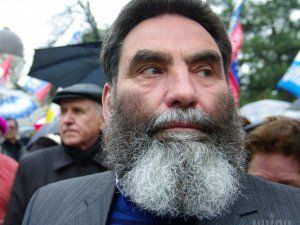
Kaurov suggests to Glazyev that militants from nearby Transnistria, an unrecognized republic in Moldova where Russian troops are stationed, could enter Odesa [to help implement the plan of seizing the Oblast Concil – Ed]. He complains that those who entered Crimea were “serious people, serious uniforms,” who told and showed “decent arguments,” while the “decisive groups” in Odesa had no official documents or arguments. Kaurov says that these arguments need to be organized, as well as means for buying ammunition. Kaurov stresses that they need to “break the situation to their benefit” as soon as possible; Glazyev promises to connect him with “competent people.”
Conversation 4. The same Kaurov speaks to Sergei Tkachuk, Glazyev’s assistant. He says that he obtained the blessing of Metropolitan Agafangel, one of the leaders of the pro-Russian wing in the Ukrainian Orthodox Church of the Moscow Patriarchate, to repeat the Crimean scenario. Kaurov says he has people ready to negotiate with police structures, so they would defect to the pro-Russian insurgents’ side, if they are given guarantees, and “several hundred Spartans” who would seize the Oblast or city council and demand to hold an extracurricular session to recognize the Kyiv authorities as illegitimate. He asks Tkachuk for “arguments” that the Crimeans had, i.e. “friends from the Russian self-defense” [unmarked soldiers – Ed], and money for the “spartans.” Tkachuk asks for Kaurov’s telephone number to connect him with the right people.
6 March 2014. The Russian army continues capturing Ukrainian army units in Crimea, seven countries condemned Russia’s invasion of Ukraine and cancelled the preparation for the G8 summit in Sochi. Russia’s permanent representative to the UN Vitaliy Churkin demonstrates a letter from runaway Ukrainian President Yanukovych asking Russia to introduce troops at a UNSC session. The Sevastopol city council adopted a decision to join Russia; the Crimean Supreme Council makes a decision to hold a referendum on joining Russia on 16 March.
Conversation 6. Glazyev calls Sergei Aksenov, who was elected as Chairman of the Crimean Council of Ministers at the time, and says that the questions for the referendum should be changed “so the people would definitely understand them.” Aksenov answers that the questions were formulated based on materials of Russian legal advisors sent to Crimea in order to create legal acts compatible with the Russian State Duma. One of the groups represented the interests of Viacheslav Volodin, the Deputy Head of the Russian Presidential Administration.
Glazyev asks Aksenov to meet with Oleg Tsarev, a Ukrainian MP from the Party of Regions who after the Euromaidan left for occupied Donbas to build up “Novorossiya” there, saying he is the only MP of Ukraine’s Verkhovna Rada which Russia trusts.
Then, Glazyev proposes Aksenov to resume an economic plan for Crimea which was developed under [supposedly - Vasyl] Dzharta [a Ukrainian politician who chaired the Council of Ministers of Crimea in 2010-2011 – Ed]. This plan was titled “Corporation for the development of Crimea” which was to receive up to $10 bn in credit from Vneshekonombank. Aksenov agrees to discuss the plan.
This proves that Russia was planning the occupation of Crimea since at least 2011, as at that time there was a plan for the economic development of the Ukrainian peninsula.
Veracity of the tapes
When Ukrainian prosecutors published the first part of the Glazyev tapes in August 2016, Konstantin Zatulin confirmed that such conversations between him and Sergei Glazyev did take place in an interview with bfm.ru, but that the videos of the conversations grapublished by the GPU were a “compilation and manipulation” of his words. He admitted that after the Euromaidan revolution in Ukraine, he and Glazyev created a fund “We are all Berkut,” referring to the riot police who are accused in killing anti-government protesters in central Kyiv in 2014, “to help the people fighting against the coup, and against the coup in Ukraine. I am not ashamed of this in the least, and have no intention of offering excuses to anyone,” he told.
Commenting to RFE/RL’s Crimean service, Ruslan Kravchenko, a prosecutor of the Chief Military Prosecutor’s Office, said that the veracity of the “Glazyev tapes” was verified by an expert assessment, but didn’t specify the details and authors of the expert conclusion. Yanukovych’s defense in court, on the other hand, said that the court can’t use the tapes as proof, as Ukraine’s Prosecutors office classified the court decision to wiretap the telephone of Putin’s advisor, and therefor it’s impossible to verify that it exists.
In the same article, the leader of the Crimean Communist Party Leonid Grach said that Glazyev and Zatulin were unlikely to play a key role in Russia’s occupation of Crimea, asserting that the top Russian authorities were engaged in the process. As well, he said it’s unlikely that Knyrik and Pershikov had any serious influence on the formation of the government of Aksenov. According to Grach, Oleg Belaventsov, the future representative of Vladimir Putin in Crimea and close friend of Russia’s Minister of Defense Sergei Shoigu, who offered Grach a position in the Crimean government, had the final say, and the government was formed with the participation of ousted ex-president Yanukovych.
Meanwhile, former Russian MP Ilya Ponomaryov, the only Russian MP who voted against the annexation of Crimea, told 112.ua in September 2017 that Russian President Vladimir Putin oversaw the entire operation to occupy Crimea, but ideologically and strategically the entire plan for seizing the territories of Ukraine was developed by his assistant Vladislav Surkov. He noted that he heard from Surkov directly that the Crimean branch of Yanukovych’s Party of Regions promised that they could carry out the operation by themselves, but after the Crimean Tatars showed strong resistance, the Russian side used the services of the criminal world – Aksenov and Konstantinov. He added that the Kremlin purposefully placed a bandit to manage occupied Crimea so it would be possible to control the crowd.
Read more:
- After the Glazyev Tapes: what Moscow’s interference in Ukraine means for the Minsk Agreements
- Ukraine publishes video proving Kremlin directed separatism in eastern Ukraine and Crimea
- Russia prepared to occupy Crimea back in 2010 and other things we learned from Yanukovych’s treason trial
- Could Ukraine have fought off Crimean occupation? A crucial document you should know
- Meet the people behind Novorossiya’s grassroots defeat

